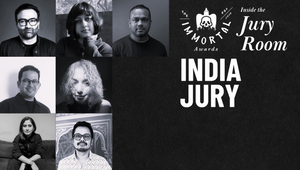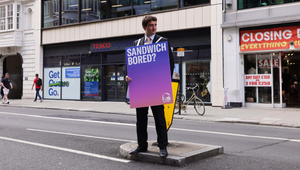
The New New Business: Fabienne Queyrane and the Shift in Selling to the Creative Industry

Fabienne joined Publicis 10 years ago to launch the Prodigious brand and has since played a key role in developing the Groupe’s production solutions, leading its marketing, communications, and new business. More recently, as global production strategy director, she led the Groupe’s most transformative wins in production. A strategist at heart, she is an expert at building cut-through production models that transform the way global brands reach their consumers.
Fabienne is an expert in building marketing production models that transform the way global brands reach their consumers, delivering mass personalisation at scale, at cost and with creative impact.
Prior to joining Publicis, Fabienne worked as a corporate reputation strategist in France and in the UK, building reputations and managing crises for some of the largest organisations in both countries.
LBB> What was your first sale or new business win? (Was it a big or small job? How difficult or scary was it? What do you remember about how you felt? What lessons did you learn?)
Fabienne> My first win was an in-house studio for a pet care company designed to service the EMEA region. It was a strategically key project, though small in terms of revenue. It was very difficult and very scary because it was my first one, and I had been propelled into fully leading it.
Despite the fear, it was also terribly exciting – I felt like I was inventing a model and narrative that I would use in the future.
The key lesson I learned was that when pitching or selling, you can't leave anything to chance. You must check every detail, speak to all stakeholders, take all the advice you can, and stay close to the people who know the client and brands best – they have the most valuable insights.
LBB> What was the best piece of advice you got early on?
Fabienne> The best piece of advice I received was to start preparing straight away, and even before if you can, because every second counts.
When you know a pitch is coming, you should already be working on it. You should even be anticipating whether it may come. It can be challenging because you can get dragged into different priorities, especially when you're managing multiple pitches simultaneously.
Overall, you need to define your USP fast, identify resources early and get them going as soon as possible with that USP in mind; that way, everyone is working in the same direction from the onset.
LBB> And the worst?
Fabienne> I can’t recall the worst piece of advice, however, I can share a common pitfall which I call the "slide dump" approach. People often start by dumping a lot of slides from past work into a deck, believing it's a good starting point. This leads to an overload of irrelevant content and wasted time trying to fit it into a coherent narrative.
Instead, it's crucial to first think about the story you want to tell and the key components of your response. Only then can you repurpose existing content that supports your narrative.
LBB> How has the business of ‘selling’ in the creative industry changed since you started?
Fabienne> Selling in the creative industry has shifted from selling great ideas to also selling results and proof of results. There was a time when a great idea stood on its own, but now everything needs to be proven, checked, and double- and triple-checked. The focus is on what the idea will deliver and proving that it’s the right thing to do, emphasizing the return on investment.
LBB> Can anyone be taught to sell or do new business, or do you think it suits a certain kind of personality?
Fabienne> Responding to new business pitches requires a variety of personalities. You need a mix of outgoing, sales-oriented people who can create good chemistry and more strategic thinkers who focus on the story and unique selling propositions. While anyone can be involved in the sales process, different roles within new business may require different personality types. Most importantly, it’s about finding the personalities that will match your clients’.
First and foremost, people buy people: chemistry is fundamental, not to say everything!
LBB> What are your thoughts about the process of pitching that the industry largely runs on? (e.g. How can it be improved - or does it need doing away with completely? Should businesses be paid to pitch? What are your thoughts about businesses completely refusing to engage in pitching? How can businesses perform well without ‘giving ideas away for free?
Fabienne> Pitching forces companies to rethink their strategies and ensures competition, which can lead to better outcomes.
However, the process should be more controlled, and brands need to be considerate of how much they ask from their suppliers. There should be best practices or guidelines to help brands develop RFPs.
It’s a costly exercise for suppliers, and companies don’t always acknowledge the extent of the investment required.
LBB> How do you go about tailoring your selling approach according to the kind of person or business you’re approaching?
Fabienne> You need to be close to the business and client business leads. In a large organisation, someone is likely already working with the client, so it's crucial to stay close to that person to understand both the company and the individuals you’re pitching to. If there isn't an existing lead, find other ways to gather insights.
Understand the client's needs, their problems, and the personalities of the people in the room. Some will be analytical, others more high-level, so tailor your pitch to resonate with their ways of thinking and working.
LBB> New business and sales can often mean hearing ‘no’ a lot and quite a bit of rejection - how do you keep motivated?
Fabienne> In my opinion, the yeses are so rewarding that they compensate for the no's. I see rejections as opportunities to improve and learn. It's actually dangerous to receive only yeses because it can lead to complacency. No's help you evaluate and focus on areas that need improvement.
LBB> The advertising and marketing industry often blurs the line between personal and professional friendships and relationships… does this make selling easier or more difficult and delicate?
Fabienne> Mixing personal and professional relationships can make things easier, but it needs to be managed carefully to avoid backfiring. Treat it as you would any working relationship, ensuring you don’t cross lines that could lead to negative consequences.
LBB> In your view what’s the key to closing a deal? The brand needs to like you as people, brands are likely to buy a good relationship. Do they understand my way of working and ethics?
Fabienne> Clients need to like you as people. In the end, companies buy relationships – they want to work with people they get along with and trust. Good chemistry and an understanding of the client’s way of working and ethics are crucial. It’s not just about the solution you offer but also about the relationship you can build and maintain in the long term.
LBB> How important is cultural understanding when it comes to selling internationally? (And if you have particular experience on this front, what advice do you have?)
Fabienne> Cultural understanding is very important. It’s crucial to ensure your proposition fits the global brand and resonates with the people you’re pitching to.















